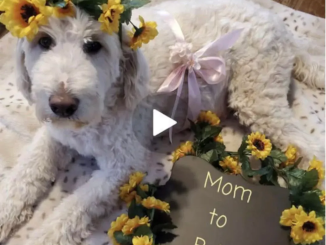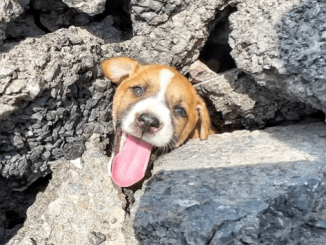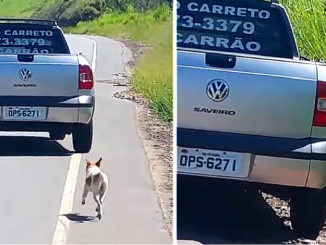
In the impoverished Gaza Strip, where most people struggle to make ends meet amid a crippling blockade, the suffering of stray dogs and cats often goes unnoticed.
Said el-Er, who founded the territory’s only animal rescue organisation in 2006, has been trying to change that. He and other volunteers rescue dogs and cats that have been struck by cars or abused and nurse them back to health – but there are too many.
So in recent weeks they have launched Gaza’s first spay-and-neuter programme. It goes against taboos in the conservative Palestinian territory, where feral dogs and cats are widely seen as pests and many view spaying and neutering as forbidden by Islam.
“Because the society is Muslim, they talk about halal (allowed) and haram (forbidden),” Mr El-Er said. “We know what halal is and what haram is, and it’s haram (for the animals) to be widespread in the streets where they can be run over, shot or poisoned.”
Islam teaches kindness towards animals, but Muslim scholars are divided on whether spaying and neutering causes harm. Across the Arab world, dogs are widely shunned as unclean and potentially dangerous, and cats do not fare much better.
Mr El-Er and other advocates for the humane treatment of animals face an added challenge in Gaza, which has been under an Israeli and Egyptian blockade since the Islamic militant group Hamas seized power in 2007. Gaza’s two million residents suffer from nearly 50 per cent unemployment, frequent power outages and heavy travel restrictions.
With many struggling to meet basic needs, animal care is seen as a waste of precious resources or a luxury at best. Mr El-Er’s group, Sulala for Animal Care, relies on private donations, which can be hard to come by.
Mr El-Er says his team can no longer keep up with the number of injured animals that they find or that are brought to the clinic. “The large number of daily injuries is beyond our capacity,” he said. “That’s why we resorted to neutering.”
On a recent day, volunteers neutered a street dog and two cats that had been brought in. There are few veterinary clinics and no animal hospitals in Gaza, so they performed the operations in a section of a pet store that had been cleaned and disinfected.
“We have shortages in capabilities, tools, especially those needed for orthopaedic surgeries,” said Bashar Shehada, a local veterinarian. “There is no suitable place for operations.”
Mr El-Er has spent years trying to organise a spay and neutering campaign but met with resistance from local authorities and vets, who said it was forbidden. He eventually secured a fatwa, or religious ruling, stating that it is more humane to spay and neuter animals than to consign an ever-growing population to misery and abuse.
Once the fatwa was issued, Mr El-Er said local authorities did not object to the campaign as a way of promoting public health and safety. The Hamas-run health and agriculture ministries allowed veterinarians to carry out operations and purchase supplies and medicine, he said.
The Gaza City municipality provided land for a shelter earlier this year. Before that, Mr El-Er kept the rescued animals at his home and on two small tracts of land that he leased.
The new shelter currently houses around 200 dogs, many of them blind, bearing scars from abuse or missing limbs from being hit by cars. At least one was adjusting to walking with a prosthetic limb. A separate section holds cats in similar shape.
The group tries to find homes for the animals, but here too it faces both economic and cultural challenges. Very few Gazans would keep a dog as a pet, and there’s little demand for cats. Some people adopt the animals from abroad, sending money for their food and care.
Over the past decade, international animal welfare groups have carried out numerous missions to evacuate anguished animals from makeshift zoos in Gaza and relocate them to sanctuaries in the West Bank, Jordan and Africa.
But there are no similar campaigns for dogs and cats, and Gaza has been sealed off from all but returning residents since March to prevent a coronavirus outbreak.
Mr El-Er’s phone rang recently and the caller said a dog had been hit by a car. Volunteers from Sulala brought it back to the shelter on the back of a three-wheeled motorbike and began treating it. Mr El-Er says they receive around five such calls every day.
Abandoned And Trapped In Deep River, The Elderly Dog started crying When The Volunteer Approached To Caress Him
In the heart of Los Angeles, a tale unfolded that touched the souls of many—a tale of abandonment, resilience, and compassion. It began with a simple phone call, one that sparked a mission of hope and redemption for a lonely soul trapped in the depths of the city’s river.

The call came to Hope in the Paws, a beacon of light for animals in distress. On the other end of the line was a plea for help, a desperate cry for assistance for an elderly dog stranded in the labyrinthine maze of the Los Angeles River. For weeks, the community had rallied around the dog, providing what little sustenance they could offer, but they knew that without intervention, his fate would be sealed.

With urgency in their hearts and determination in their eyes, the volunteers of Hope in the Paws sprang into action. But as they approached the river’s edge, they were met with a sight that tugged at their heartstrings—the elderly dog, once proud and majestic, now reduced to a trembling, frightened creature, his eyes betraying the fear and uncertainty that gripped his soul.

Undeterred by the enormity of the task before them, the volunteers pressed on, fueled by a singular purpose—to bring comfort and salvation to this vulnerable being. With each step closer, they could hear the soft whimpering of the dog, a haunting melody that echoed through the silence of the river.

But then, something miraculous happened. As one of the volunteers extended a hand of kindness towards the dog, offering nothing but love and compassion, the trembling ceased, and the fear began to ebb away. In that moment, amidst the chaos and turmoil of the river, a bond was formed—a bond forged in the crucible of adversity and sealed with the simple yet profound language of empathy.

With gentle hands and tender words, the volunteers lifted the elderly dog from his watery prison, cradling him in their arms as they made their way to safety. And as they emerged from the depths of the river, they were greeted by the warm embrace of the community, their faces alight with gratitude and hope.
The rescue of Peggy the German Shepherd was not just a triumph of human kindness—it was a testament to the power of compassion and the resilience of the human spirit. And as Peggy took her first tentative steps towards a new life, she carried with her the unwavering support of all those who had rallied behind her—a reminder that no soul is ever truly alone as long as there are hearts willing to open and hands ready to help.
So here’s to Hope in the Paws, an organization built on the belief that every life is worth saving and every creature deserving of love. Thank you for your tireless dedication, your boundless compassion, and your unwavering commitment to making the world a better place—one rescue at a time.
And to Peggy, may your journey be filled with warmth and joy, and may you always know that you are loved beyond measure. You may have been abandoned and trapped in the depths of a river, but today, you are free—free to run, free to play, and free to bask in the boundless love that surrounds you.
This is the story of Peggy the German Shepherd—a story of hope, redemption, and the enduring power of love. And as her tale spreads far and wide, may it serve as a beacon of hope for all those who find themselves lost and alone in the world.



Leave a Reply